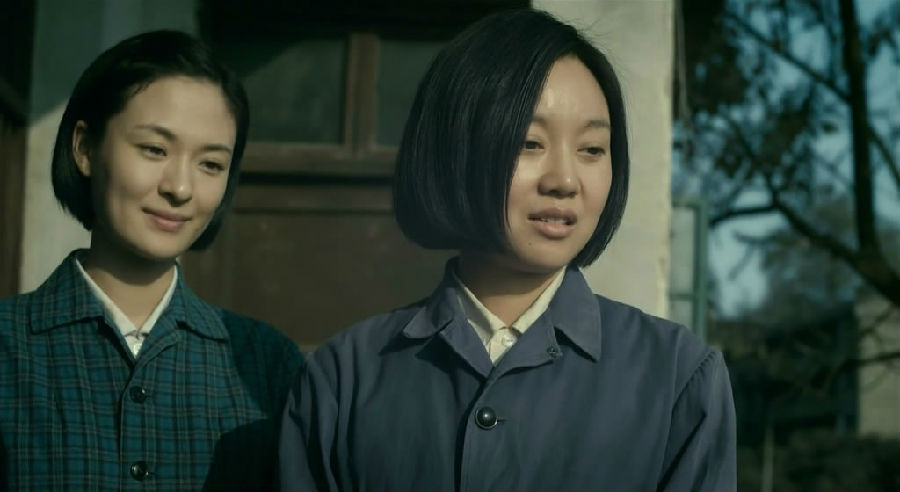
【電影簡(jiǎn)介】
1975年,在西南的一個(gè)山區(qū)小鎮(zhèn),一個(gè)以上海人為主的國(guó)營(yíng)工廠(chǎng)里,王憨與八拉頭,小老鼠,衛(wèi)軍幾個(gè)好伙伴一起在子弟小學(xué)里讀書(shū)。王憨因?yàn)樽鰪V播操的姿勢(shì)準(zhǔn)確,被老師選為學(xué)校的領(lǐng)操員。老師希望王憨在領(lǐng)操時(shí)可以穿得漂亮點(diǎn)。王憨跟媽媽要一件新襯衣,媽媽不答應(yīng)。媽媽想確定王憨有沒(méi)有說(shuō)假話(huà),找老師了解情況。在學(xué)校里看到王憨做操的情形時(shí),觸動(dòng)了媽媽?zhuān)贸黾依锊欢嗟牟计保瑤屯鹾┵I(mǎi)了布,連夜做好了新襯衣。王憨為此驕傲了一回。在河邊玩耍的時(shí)候,王憨的襯衣被水沖走,誤以為是伙伴們嫉妒,與大家頂嘴,眾人不歡而散。王憨從河里撈起了襯衣,怕媽媽責(zé)罵,準(zhǔn)備等襯衣晾干以后再回家。工廠(chǎng)里的民兵追趕一個(gè)受傷的青年謝覺(jué)強(qiáng),謝覺(jué)強(qiáng)在河邊碰見(jiàn)王憨。為了止血,謝覺(jué)強(qiáng)順手將王憨的襯衣一把抓過(guò),然后躲進(jìn)了草叢里。王憨想要回襯衣,追進(jìn)了草叢里。謝覺(jué)強(qiáng)告訴王憨自己殺了人,讓王憨不要告訴別人,并答應(yīng)以后還王憨一件新的襯衣。王憨將遇到“殺人犯”的事情告訴了伙伴們,小老鼠又將此事告訴了大人。謝覺(jué)強(qiáng)被抓走。暑假到了,王憨跟著父親去寫(xiě)生。路遇謝覺(jué)強(qiáng)的父親和謝覺(jué)強(qiáng)的妹妹謝覺(jué)紅。此時(shí)忽然下起了大雨,王憨父子倆到謝覺(jué)紅家里避雨。王憨的父親與謝覺(jué)強(qiáng)的父親聊天,得知謝覺(jué)強(qiáng)是為了懲罰強(qiáng)奸妹妹的壞蛋才殺人的。王憨第一次也是唯一一次與自己的暗戀對(duì)象謝覺(jué)紅在一起,感受到青春的萌動(dòng)。后來(lái)王憨收到一個(gè)包裹,里面是一件新襯衣。王父與王母聽(tīng)王憨講述了事情的經(jīng)過(guò),又前往監(jiān)獄了解情況,知道王憨沒(méi)有撒謊。王父與王母遠(yuǎn)遠(yuǎn)地望見(jiàn)前來(lái)探監(jiān)的謝覺(jué)強(qiáng)的父親和謝覺(jué)紅。為了維護(hù)對(duì)方的自尊,王父與王母帶著王憨從后門(mén)離開(kāi)了。單位里舉行宣判大會(huì),謝覺(jué)強(qiáng)被判處死刑。伙伴們拉著王憨一起跑去刑場(chǎng)看熱鬧。
【音頻文本】
In his semi-autobiographical movie "11 Flowers," Wang Xiaoshuai has been extremely personal in presenting the spiritual and sexual awakening of a teenager. Moviegoers may identify with the film's sentiment, but still ask for more.
The film is set in a rural town in southwest China in 1975, a year before the end of the Cultural Revolution. The 11-year-old boy Wang Han is receiving painting lessons from his father. His new artistic perspective encourages him to more closely observe the world around him, thus leading him to learn of a murder thatthe adults are gossiping about. Later, an in-person encounter with the murderer makes him contemplate the apparently peaceful – but actually tumultuous – lives of the adults' life at that time. At the same timehe is also entering puberty.
Known as one of the "sixth generation of Chinese cinema," Wang Xiaoshuai studied painting in middle schoolbefore he majored in directing at the Beijing Film Academy. The cinematography of "11 Flowers" is most impressive, and moviegoers can enjoy almost every shot like a classical painting.
Certainly the picturesque shots help viewers absorb the nuanced feelings Wang is trying to convey, but an audience needs more than just beautiful, moving pictures. Wang is perhaps best known for his sensitive portrayal of young people, and this time the hook is his personal awakening, but he falls short of the mark.
For one thing, the boy Wang Han is too mature for an 11-year-old. Portrayed as quiet and somewhat isolatedfrom his fellow playmates, the boy is often shown in close-ups staring at something in the distance and lost in thought. The director may have wished to present the character as he once was, but in doing so he has totally missed the point of awakening.
The father character is overly artsy. His longing for freedom may seem logical against the historical background, but seems odd for an obscure and ordinary man in a remote town. Moreover, his lessons on painting and Monet sound more bookish than fatherly.
Perhaps the director is occupied too much with his personal feelings. In the length of 110 minutes he takes his time showing almost every detail he could manage about the lives in a rural town in 1975. His effortcould very well appeal to the nostalgia of people who shared his experience, but for those who live outside the director's own personal experiences, the bulk of his message is lost in the distance between the viewer and the screen.
Wang has spoiled himself with "11 Flowers." The richness of personal feelings gives the movie a humanistictouch, but the lack of depth in the characters and storyline may well leave viewers wishing for more. On my scale from one to ten, "11 Flowers" gets a five.
輕松調(diào)頻EZFM 微信mrweekly











